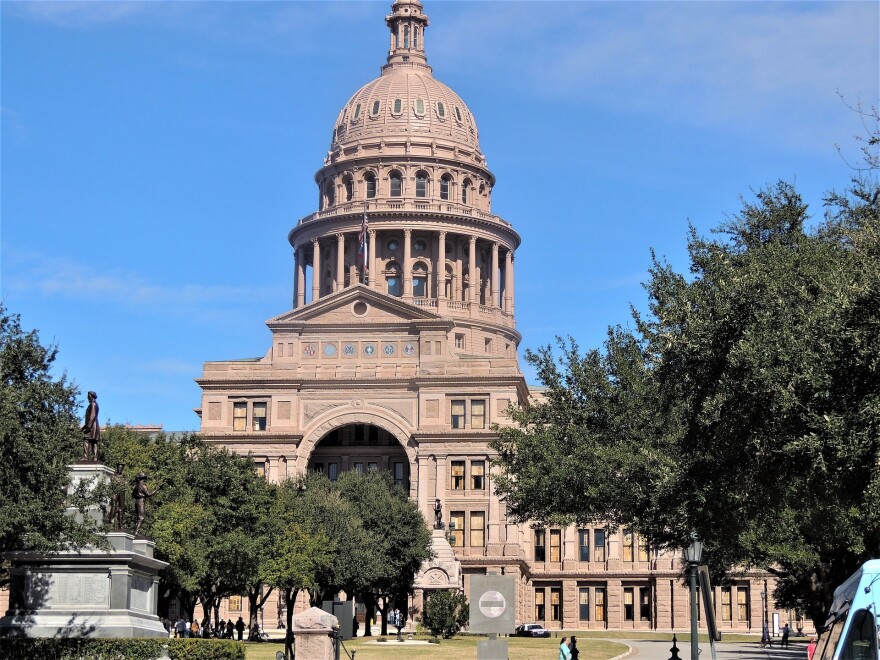Sign up for TPR Today, Texas Public Radio's newsletter that brings our top stories to your inbox each morning.
Redistricting is on the agenda for the ongoing special session at the Texas legislature following President Donald Trump’s call to add five Republican House of Representatives seats in Texas.
Redistricting typically occurs after the decennial U.S. Census, and the legislature last approved maps in 2021.
State Democrats like San Antonio-area Rep. Trey Martinez-Fischer said now was not the time for the legislature to take up redistricting, and not just because it’s off-cycle.
“To bring this now, at a time where our state really needs us to respond to the moment is absolutely just, it's a shame, and I think every voter and taxpayer out there should be appalled,” Martinez-Fischer said.
Flood relief and prevention legislation is the biggest item on the legislature’s special agenda following devastating floods across the Hill Country that left at least 137 dead.
THC regulation, eliminating the STAAR test, and other items are also on the special session agenda.
“We're not immune from playing politics, but there are real issues in front of us right now that have cost lives, and there are families and there are victims who want us to do something about it, and so I think we should read the room and get to work and put politics away for another day,” Martinez-Fischer said.
After Texas Democrats broke quorum to prevent a restrictive voting law in 2021, the legislature instituted new rules to prevent repeats in the future — a $500 daily fine and a reduction in the amount of money legislators have to hire staff among them.
Martinez-Fischer said all tools, including breaking quorum, remained on the table.
“I don't think anybody should underestimate the collective will of Texas House Democrats when it comes to defending democracy,” he said. “So that's full stop. On top of that, rules are rules. Rules are not necessarily legal.”
TPR’s journalism is free to read, but not free to produce. If you believe in independent, local journalism, help us keep it going.
The rules have not yet been tested in the courts, and Martinez-Fischer suggested they may not stand up to legal scrutiny.
Breaking quorum is one of the few mechanisms Texas Democrats, solidly in the legislative minority, have to respond.
State Rep. Barbara Gervin-Hawkins, another San Antonio-area Democrat, sits on the Texas House redistricting committee.
She said she was most concerned about the potential to lose districts that represent large numbers of Black voters.
“D.C. has literally reached their arm into the state of Texas,” she said. “Can you imagine the divisiveness that's going to occur, trying to take away particularly African American seats, iconic, historic seats?”
The U.S. Department of Justice has said four majority-minority seats the Texas legislature approved in 2021 in the Houston and Fort Worth areas are unconstitutional racial gerrymanders. Abbott’s special session agenda item on redistricting makes specific reference to the DOJ’s concerns as the rationale for redrawing maps.
“It looks like the White House is trying to start a race riot here in Texas,” Gervin-Hawkins said of the move.
She said her goal as a member of the redistricting committee is to ensure members of the public get their chance to comment on the process, mobilizing and engaging voters on the redistricting issue, and potentially break quorum if necessary, despite the potential consequences.
“It's severe, but this redistricting is severe, too, and so sometimes we just have to pay a heavy price to deal with what the situation is,” she said.
Democratic lawmakers and governors in other states — most notably California — have said they would retaliate with their own redistricting to boost Democratic House members from their states if Texas goes forward with its plan.
Republican Texas Reps. Ryan Guillen, Marc LaHood, and John Lujan did not respond to TPR’s request for comment.





